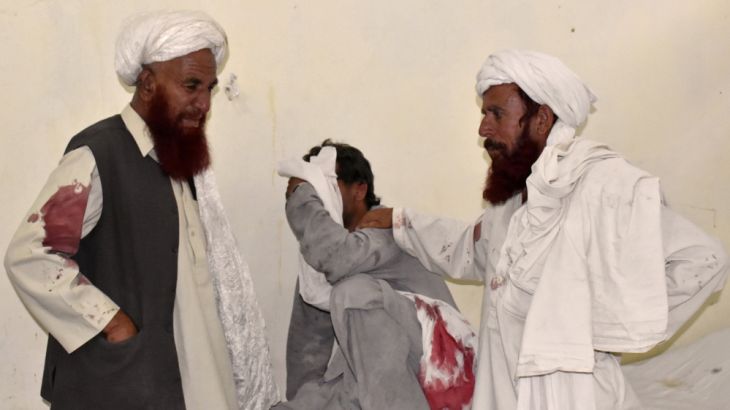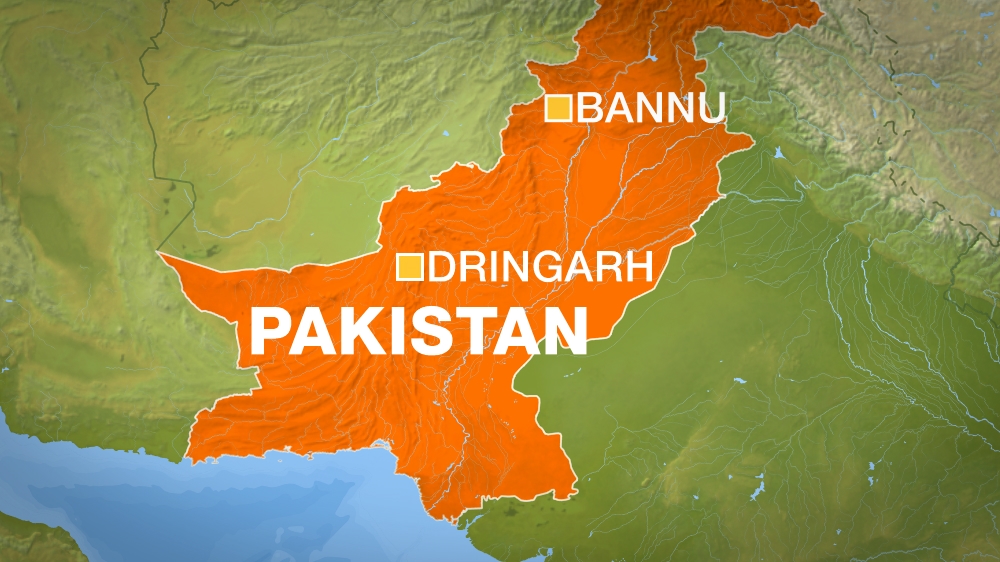133 dead after two separate attacks on Pakistan political rallies
The attacks raise fears of increased violence as the country prepares for a general election later this month.

Islamabad, Pakistan – A powerful explosion at a political rally in Pakistan’s Balochistan province has killed scores of people, according to officials, as a separate blast at another campaigning event further north resulted in the deaths of at least four people.
The two incidents, which killed at least 133 people on Friday, have raised fears of an increase in violence as the country prepares for a general election later this month.
Keep reading
list of 4 itemsCroatians vote in election pitting the PM against the country’s president
Solomon Islanders vote in election that could shape ties with China
Analysis: Ruling party errors give Turkey’s opposition hope for future
In the southwest town of Dringarh, about 35km south of the Balochistan provincial capital Quetta, a suicide attacker targeted a rally of the Balochistan Awami Party (BAP), killing at least 129 people, hospital officials told Al Jazeera.
At least 73 bodies were moved to Quetta’s main Civil Hospital, said hospital official Ali Mardan. A further 37 bodies were moved to Mastung’s Nawab Ghaus Baksh Hospital, said local official Qaim Lashari. Twelve more bodies bodies were received at Quetta’s Bolan Medical Complex and one other at the Combined Military Hospital, sources said.
On Saturday, officials said an additional six people died of their wounds after the attack.
“It was a suicide bomber,” said provincial home minister Agha Omar Bangulzai.
There were conflicting claims of responsibility for the attack, with both the Islamic State of Iraq and the Levant (ISIL, also known as ISIS) and a faction of the Pakistani Taliban claiming the attack, in statements released to the press.
The BAP’s candidate Siraj Raisani was running for election to the provincial assembly in his home district of Mastung, where the attack took place. The area has been the site of several attacks by the Lashkar-e-Jhangvi (LeJ) armed group, although those have mostly targeted Shia Muslim pilgrims bound for Iran.
Ethnic Baloch nationalists, who are fighting for independence from Pakistan, have also claimed several attacks on election candidates in the region in recent days.
Pakistan is heading to the polls on July 25.

Explosion in Bannu
Earlier on Friday, another explosion targeted an election rally in the northwest town of Bannu, police said, killing at least four people, and wounding 19 others.
The blast occurred just after a rally hosted by the JUI-F religious political party ended on Friday morning, said a police official, speaking on condition of anonymity.
“The rally was in the Huwaid area, and the explosion occurred as people were dispersing after the rally,” said the official. “It was an IED (improvised explosive device) planted in a motorcycle and set off by remote control.”
The rally was hosted by former provincial chief minister Akram Khan Durrani, a senior JUI-F leader who is running for a seat in Pakistan’s upcoming polls. Durrani was unharmed, police said.
On Tuesday, prominent politician Haroon Bilour was killed in a suicide attack at a Peshawar rally that claimed 20 lives and wounded 69 others.
That attack was claimed by the Tehreek-e-Taliban, also called the Pakistan Taliban, which also claimed an attack that killed Bilour’s father, a staunch opponent of the armed group, in 2012.
No group immediately claimed responsibility for Friday’s bombing in Bannu.
“Whatever has happened in Peshawar and Bannu, it is a chain, there are enemies who want to derail democracy,” Balochistan Awami Party chief Saeed Hashmi told Al Jazeera via telephone.
He said that the party would observe three days of mourning before resuming election campaigning.
“It is obvious that we will rethink security a bit, but the process will continue.”
Friday’s attacks have stoked fears of a return to the pre-poll violence that saw more than 158 people killed in the six weeks leading to the last election in 2013, according to data from the Pakistan Institute of Peace Studies research organisation.
Pakistan has been battling the Pakistan Taliban and its allies, who seek to impose a strict interpretation of Islamic law on the country, since 2007.
In 2014, the military launched an operation that displaced the Pakistan Taliban’s fighters from their erstwhile headquarters of North Waziristan, causing a drop in violence.
Sporadic high-casualty attacks, however, have continued to target both civilian and security forces targets since then.
Asad Hashim is Al Jazeera’s Digital Correspondent in Pakistan. He tweets @AsadHashim.
Additional reporting by Saadullah Akhtar in Quetta.